Here is one of my favorite items in the OurHistoryMuseum collection. When this June 1, 1865 letter was written, America had just completed the Civil War three weeks prior. Abraham Lincoln was assassinated just three more weeks before that. It was a time of great tumult.
The author, Alonzo Bell, wrote to his wife Mary about his trip from Washington, DC to Mount Vernon, passing Alexandria in the process. Ten years later, he would go on to become Assistant Secretary of the Interior under President Hayes. His writing is magnificent, and his appreciation for the beauty of things comes through, well, beautifully, in his writing. More information about Alonzo Bell can be found here, here, and here. A friend at Mount Vernon actually verified that his name appeared in the guestbook that day.
While I love an old letter, I have a strong preference for a transcribed old letter. I have done most of the work transcribing this one, but I am looking for some help finishing the transcription. I've left more than 30 words that I couldn't make out in the numbered brackets below. Please leave those in the comments if you can make them out.
Every letter that is transcribed digitally unlocks history because it becomes searchable for the first time. It's part of the mission of OurHistoryMuseum.
For example, I absolutely love his description of Alexandria:
. . . Alexandria, an old dilapidated city which seems to have been touched by some passing blight and bears the evidence of its decline on its wharfs [sic], stone houses, dwellings. I had almost said to its inhabitants themselves. It was once a lovely [6] but the breaking out of the war, sealed its beauty, and it’s barren hills, and dusty fields, bespeak the presence of the armies that have sapped its life and made it the [7][8] of the tens of thousands who have gone forth to battle.
Full transcription courtesy of William James Griffing of the Spared and Shared blog:
On the banks of the Potomac, fifteen miles below the city of Washington is Mount Vernon—the former residence, and now the last resting place of the Father of our country. It was my privilege to be one of a select party who visited the Tomb a few days since and the remembrance of the trip being still fresh in my memory, thought it no waste of time to note on paper a few of its leading features. We left the wharf at the foot of Seventh Street at 9:30 AM and arrived at the estate at 11:30 AM.
The scenery on either bank of the river was charming; the low lands and hills covered with verdure with here and there ground broken by the ploughman for future of cultivation—the whole interspersed with heavy woodland and fields of waving grain, betokened little of that desolation which four years of war have brought on other portions of Old Virginia.
Farm houses could be seen as in the days of yore, orchards in full bloom, while herds of cattle grazing peacefully in the fertile fields made a scene of quiet beauty over which Nature herself might well rejoice, as giving promise of a new order of peace and prosperity. On the heights overlooking the river, and commanding the approach to the Capital, a number of forts could be seen, their heavy guns so trained that at a moment’s notice they could send their destructive missiles on the errand of death. But unharmed, we passed beneath their frowning gaze for our good vessel bore the flag of the free, and the answering flutter on each hilltop told that friends—not enemies—were there.
A few miles below we touched at Alexandria, an old dilapidated city which seems to have been touched by some passing blight and bears the evidence of its decline on its wharves, store houses, dwellings. I had almost said its inhabitants themselves. It was once a lovely spot but the breaking out of the war, sealed its beauty, and its barren hills, and dusty fields, bespeak the presence of the armies that have sapped its life and made it the grand van degoon [?] of the tens of thousands who have gone forth to battle.
It was on these hills and in these valleys that the hosts of Grant and Sherman were encamped before the Grand Review. But they have gone. Their tents have been folded for the last time. A few weeks will see the armed legions whose numbers and valor have saved the Republic vanish away like morning mist before the warm genial rays of Peace. But we must leave this place; let us hope that a few years will see it in a new dress, possessed of its former beauty—with enterprise to build it up and develop its wealth, and the love of freedom to stimulate it to a higher degree of local intelligence.
On the Maryland side of the Potomac we see Fort Washington—a massive work, one of the oldest and most important in this vicinity. It is fortified by guns of the heaviest caliber and its commanding position would make it a difficult point for any hostile fleet to attempt to pass. But here we are within sight of Mount Vernon. A bend in the river hides the old mansion from view but for a minutes patience brings us along side of the little dock and without delay we move up the mansion pathway that leads us to the Tomb.
There are no loud shouts or laughter in boisterous expression of feeling for young and old feel the sacred character of the place and the necessity of evincing by becoming conduct due respect for the memory of the great departed whose ashes repose here. A short walk from the beach and we stand in the presence of the tomb. It is a plain unpretending structure built of brick and is not unlike hundreds of tombs that many be seen in the country church yard of almost every section. A gated door protects the visible sarcophagus within and prevents the rude hands of curiosity hunters from mutilating the interior of the vault.
We could hardly bring ourselves to believe as we gazed through the iron doorway that within that marble coffin the bones of the Great Washington were laid. Fancy went back over the track of years and we could see him as he stood near this very spot, full of hope and life. Here his country finds him in the depth of her trouble. Here he devotes himself to her welfare and buckles on the sword which she gives. Here he bends in lowly prayer and asks of Heaven guidance and strength. Here he parts from his loving home and goes forth to save his beloved country or die in her defense. Here he returns after years of toil and danger to hang up the sword which he had wielded through seven long, bloody years. Here he again hears the voice of a free people calling him to preside over their affairs. He goes forth to labor again, and after eight years of toil in the paths of statesmanship, he returns to this beautiful spot to live the remainder of his days in peace and to enjoy the applause which a grateful world bestows upon him.
Years have passed since then and fancy cannot bring from that silent tomb before us a living form of our loved Washington. He is bones already, crumbled to dust are these, but his spirit has long since returned to the God who gave it. Yet who shall say that he is dead while his example liveth? or that he is no more when the inspiration of his life moves millions to emulate his virtue and follow his teachings?
The sarcophagus is of solid marble over which is laid a lid of the finest Italian block. On this is carved the arms of the Nation, resting on its flag, and underneath are the simple letters, “Washington”—few [letters] indeed for so great a name! Yet who could add more to the simple grandeur of that one word standing alone without test or comment. It was in our estimation more eloquent than the most studied inscription ever carved on monumental brass or stone. Language cannot add to the lustre of that name nor can epitaph coined by man’s genius elevate the majesty of that sublime character.
We turned from this holy spot with sorrow for we could have lingered hours in its presence—so full of silent voices send each shadow of tree, and shrub, and stone. Even the robin and swallow that had formed a quiet nest within the tomb itself spoke to us of time changes like the bird comes and go and then pass away forever. Other birds will seek place in future seasons. Other forms will gather around the tomb in the years to come, yet the generations which follow forget the ones that have passed and act and build where others founded, without attempt that their season will soon be over and that they too must migrate in the obedience of the great law of change.
The house has has been so often described that I will not detain you a moment to describe it here. The hallway, parlor, dining room and kitchen bespeak the customs other days in the old-fashioned and quaint trimmings. The room in which Washington died is shown to the visitor. It is unfurnished and is on the second floor of the north wing of the house.
The key of the Bastille presented by Lafayette hangs in the main hall and attracts much attention. Could it speak and tell its story of the French Revolution, what secret horrors it would unfold. It was a fitting complement to our fine institution that the noble Frenchman who had saved our cause should transfer the keeping of Washington, the key of the most horrible despotism that ever blighted the fair fame of liberty loving France.
After a stroll through the garden; along the shady walks and among the scenes of greatest interest; a cooling drink from the old well and a happy hour in the old-fashioned summer house where the Sage of Mount Vernon was wont to sit in other days, we prepared to return.
We stopped again at the Tomb on our way to the boat, and gathered some wildflowers and dried leaves to carry away as a keepsake of the hallowed spot. We shall preserve them not for their beauty but for the blessed memories which like sacred incense will be borne to us as we look at them in the years to come. They grew within the shadow of a holy sepulcher and their silent presence shall be to us as an angel visitor, telling us that immortality can only be found in the practice of Gods––in immutable laws of Truth and Justice.
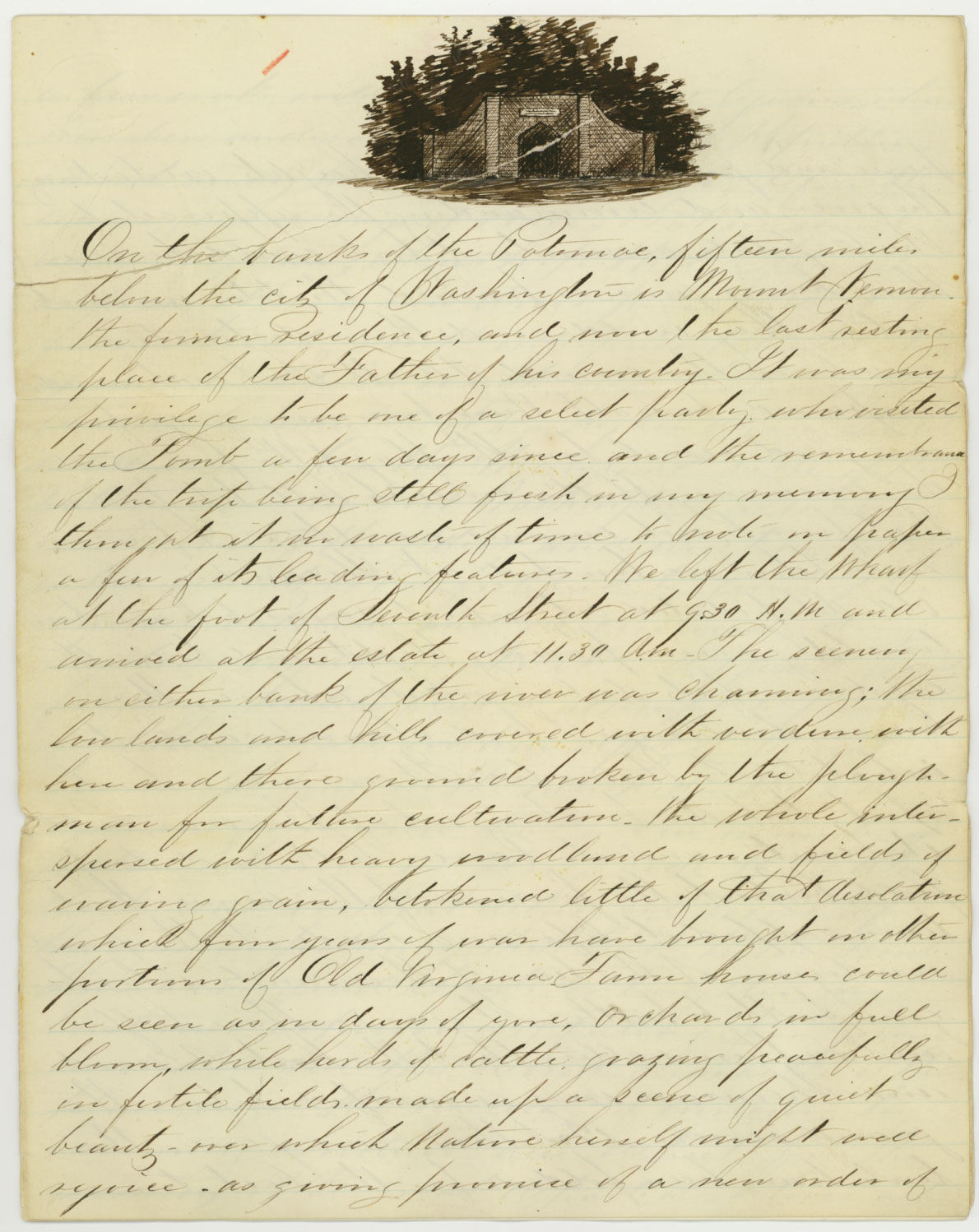
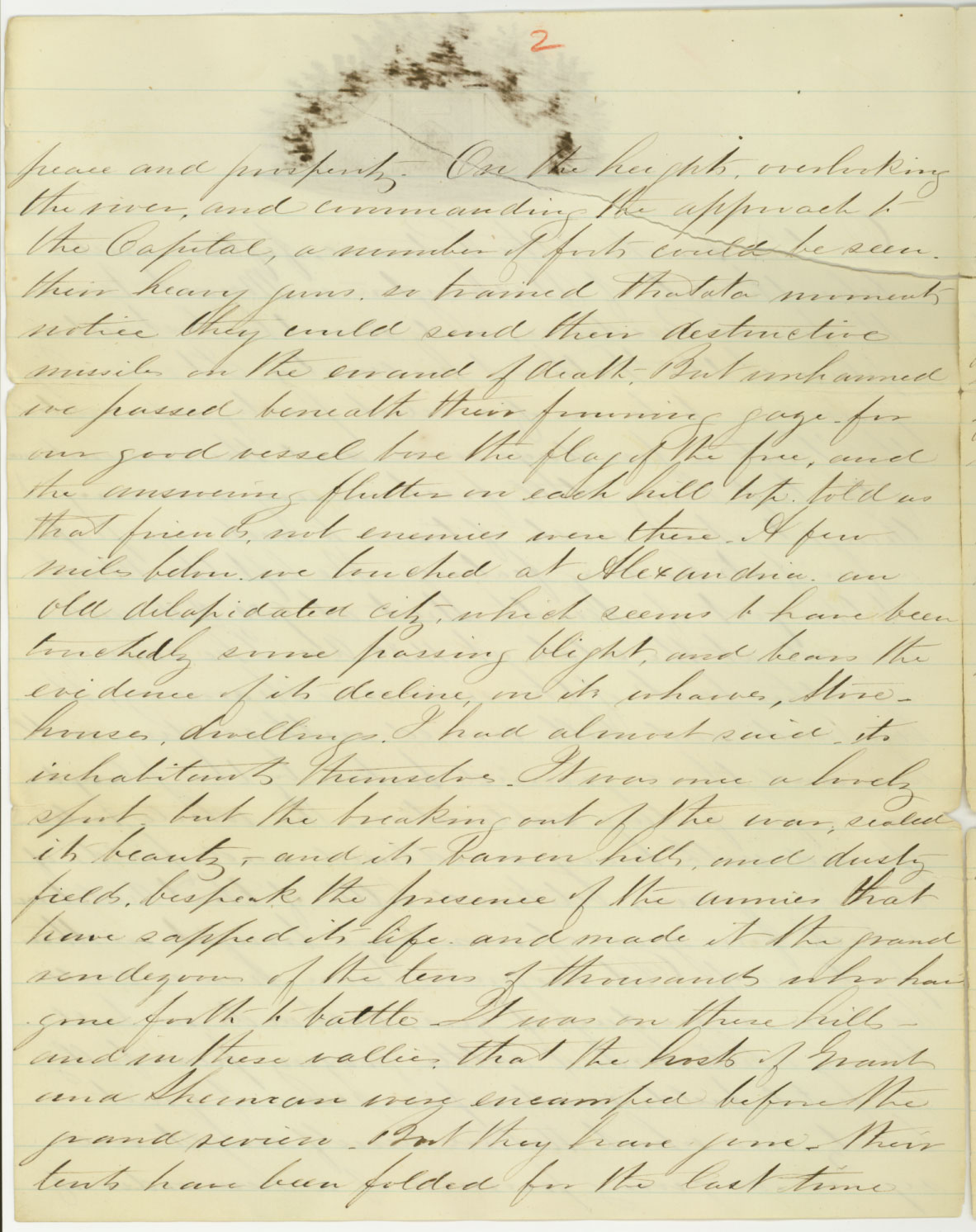
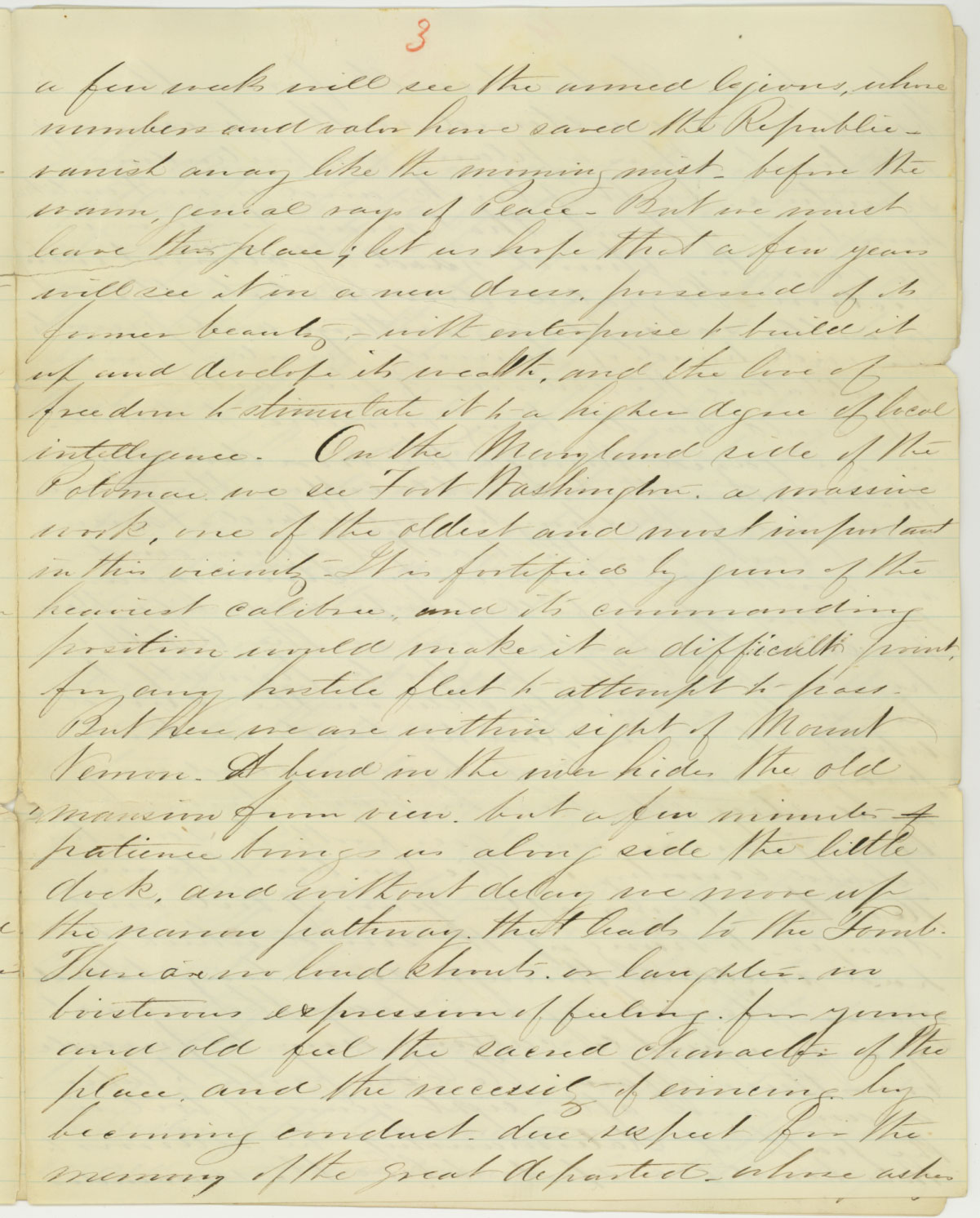
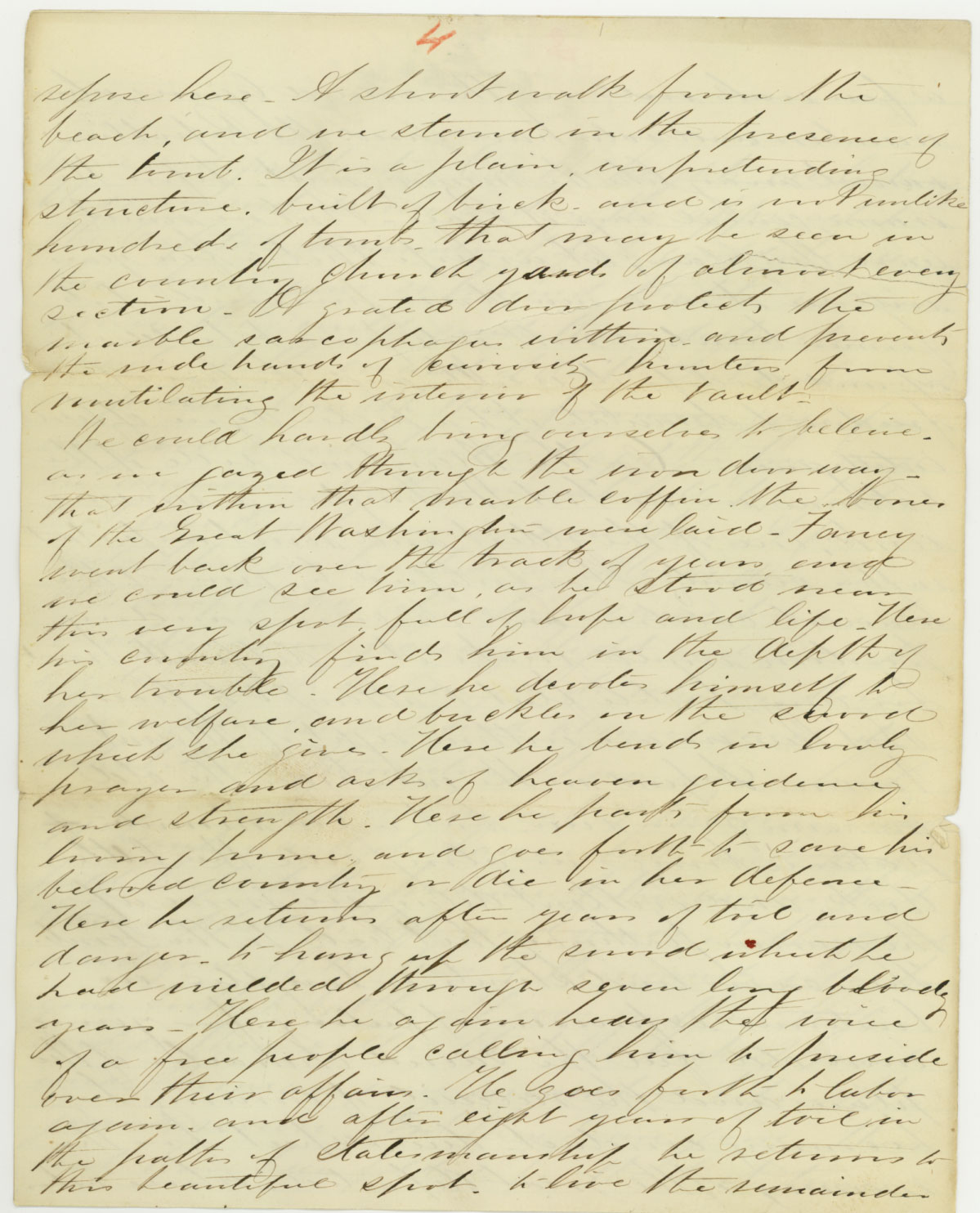
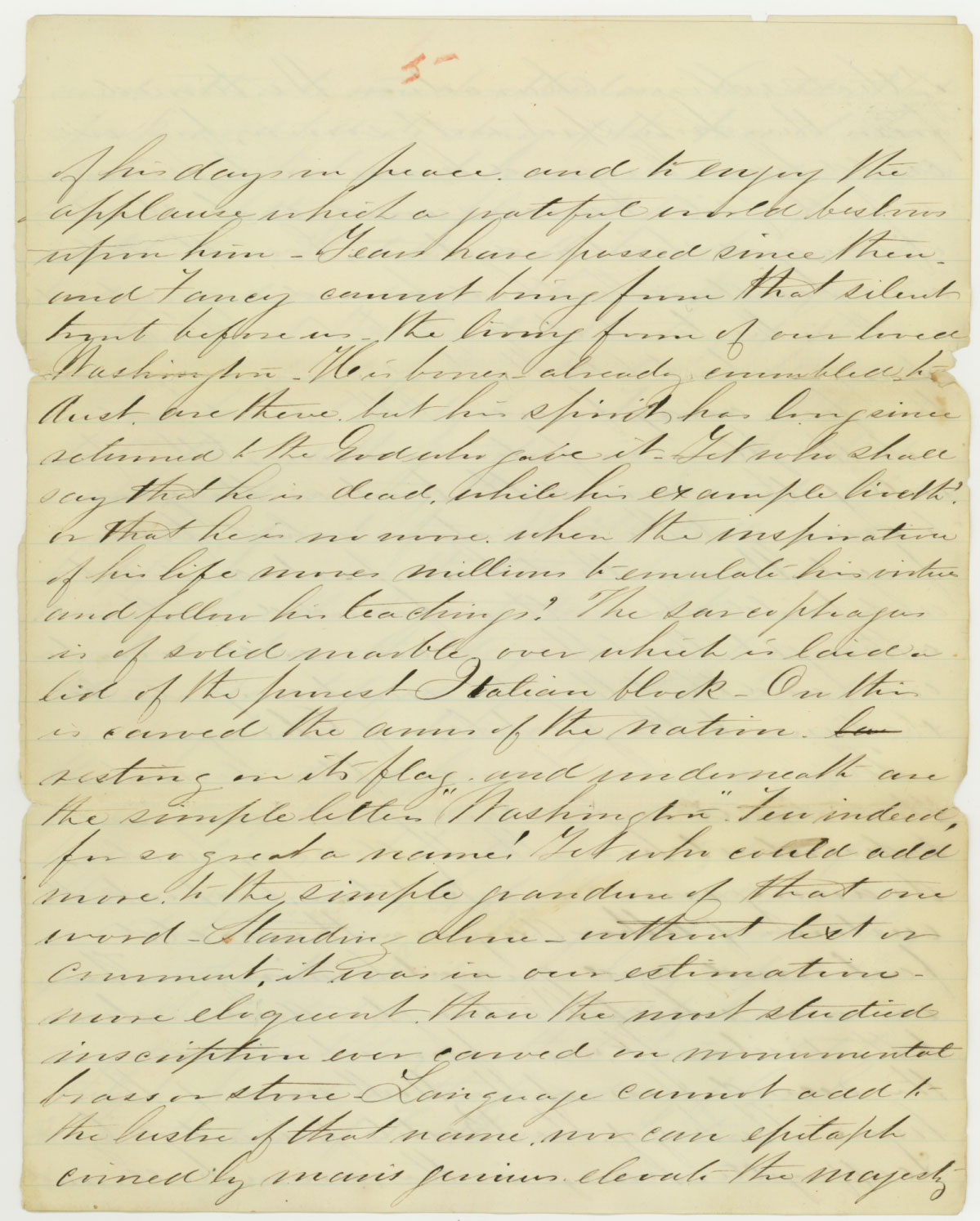
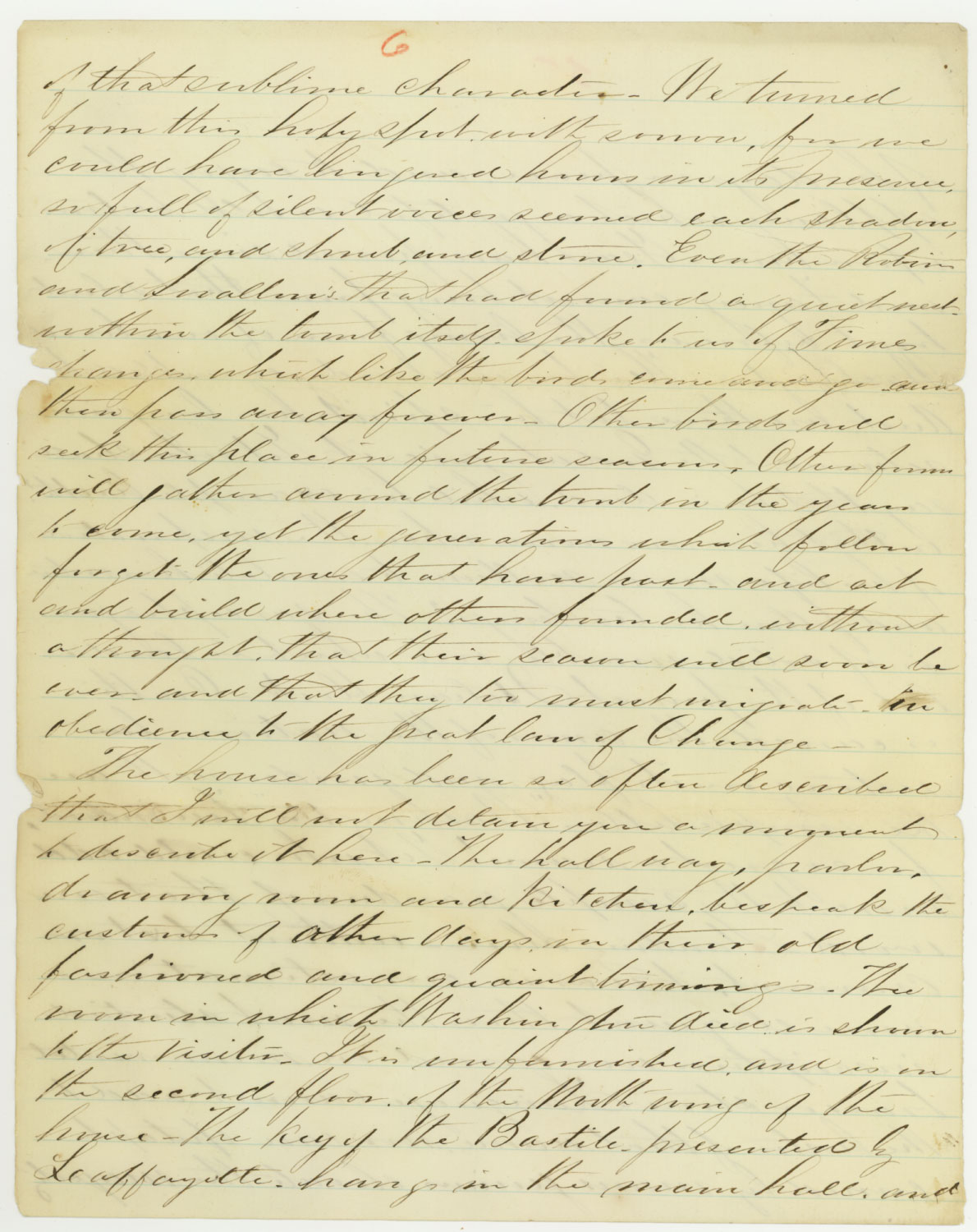
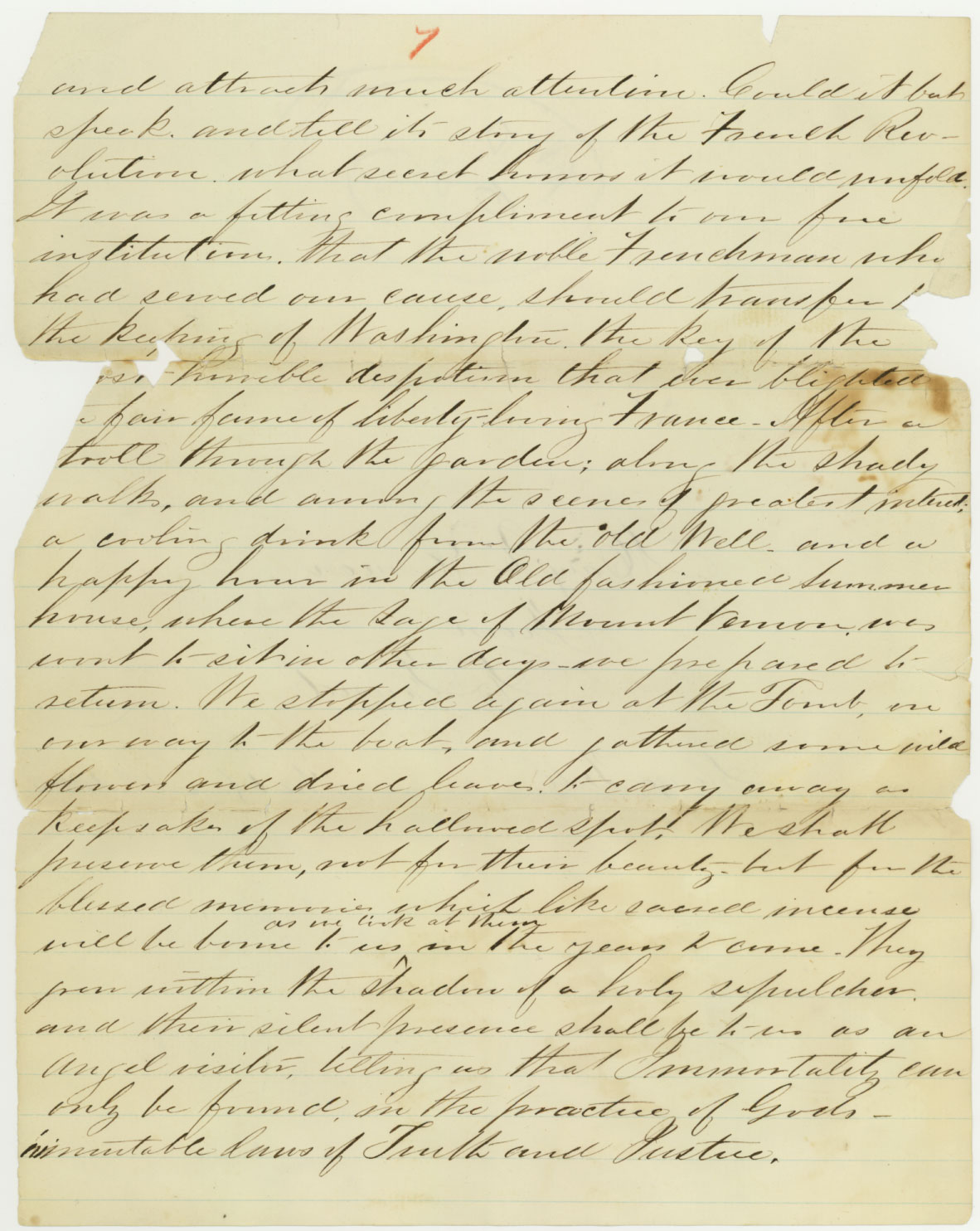
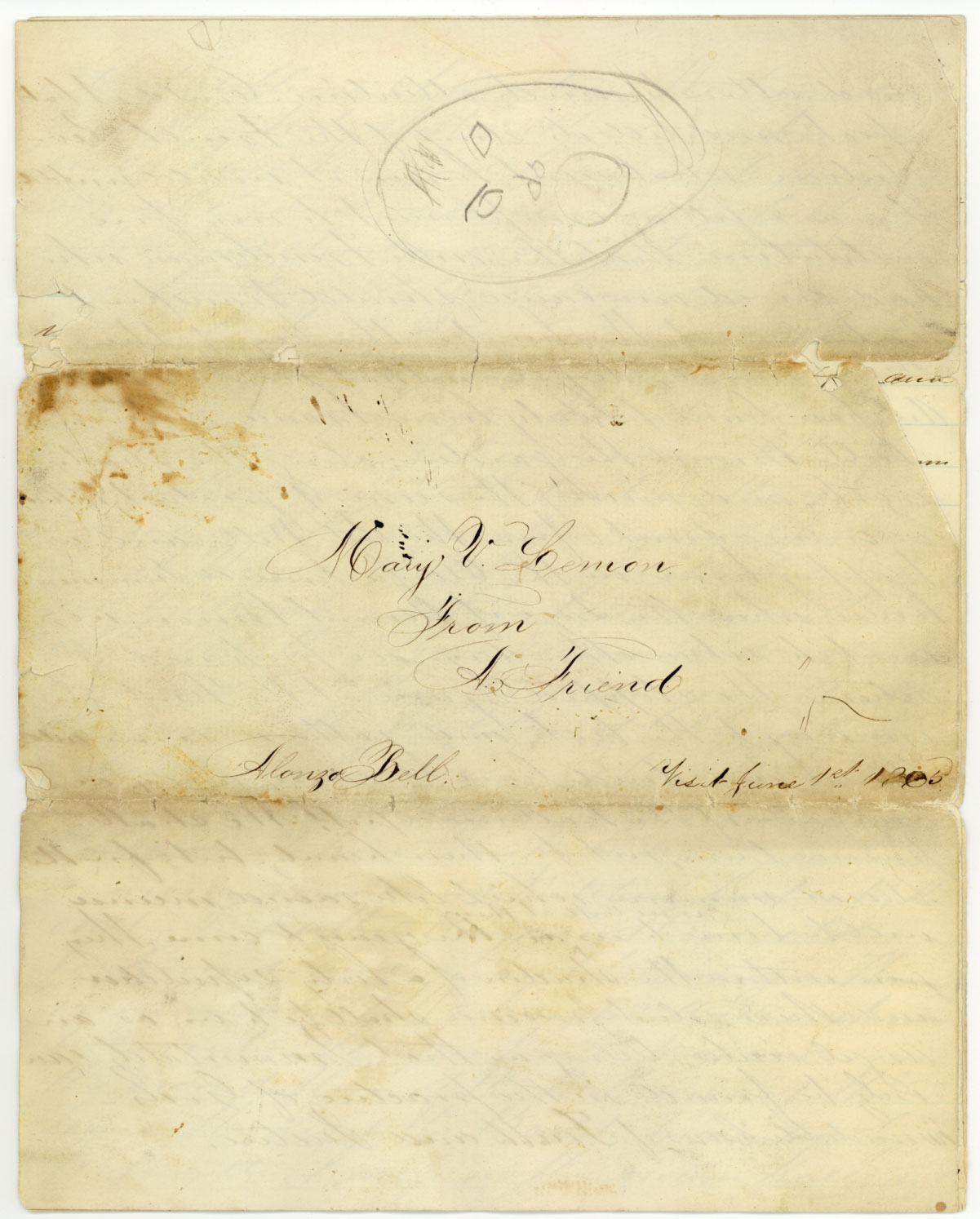

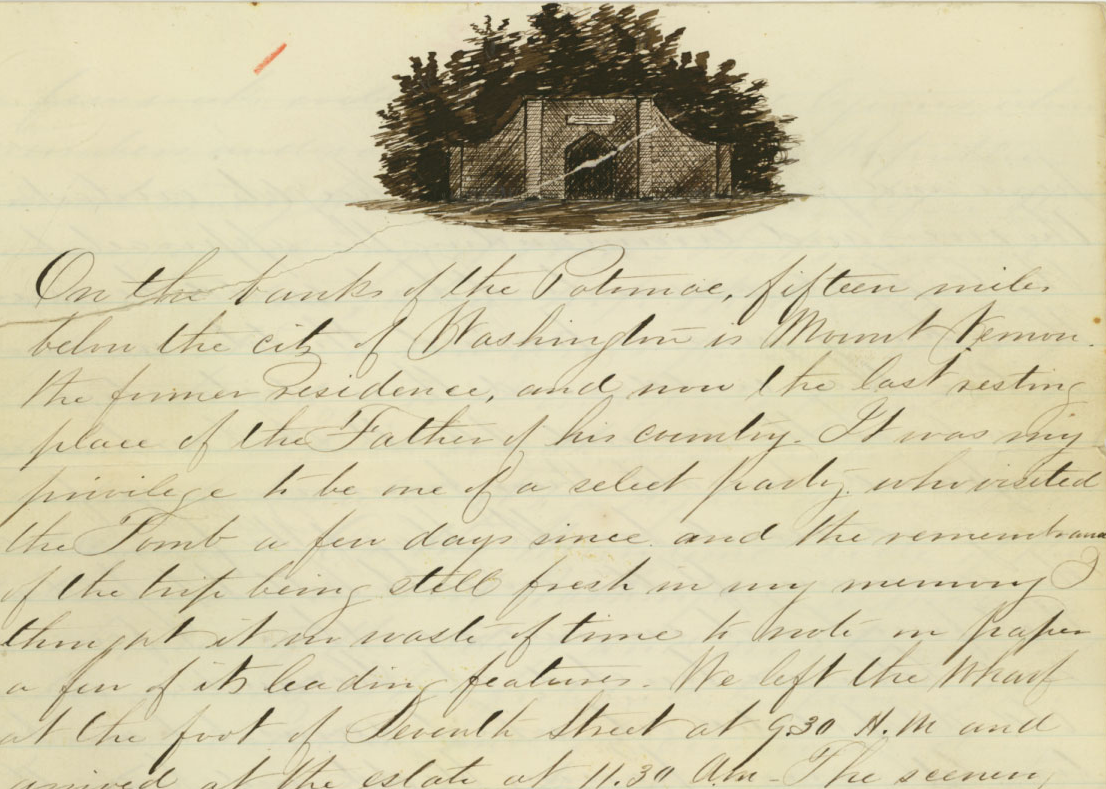

Leave Comment